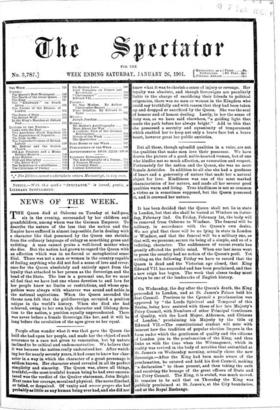On Wednesday, the day after the Queen's death, the King
proceeded to London, and at St. James's Palace held his first Council. Previous to the Cpuncil a proclamation was approved by "the Lords Spiritual and Temporal of this Realm, being here assisted with these of her late Majesty's Privy Council, with Numbers of other Principal Gentlemen of Quality, with the Lord Mayor, Aldermen, and Citizens of London," proclaiming his Majesty by the title of Edward VII.—The constitutional student will note with interest how the tradition of popular election lingers in the form under which the gentlemen of quality and the citizens of London join in the proclamation of the King, and thus links us with the time when the Witeiaagemot, which in reality was revived in the body of notables that assembled at St. James's on Wednesday morning, actually chose the new Sovereign.—After the King had been made aware of the proclamation, he entered and held his first Council, making • a declaration" to those present, and then taking the oath and receiving the homage of the great officers of State and the Privy Council. The King, it is stated, was much moved. It remains to be said that on Thursday the King was publicly proclaimed at St. James's, at the City boundaries, and at the Royal Exchange.


















































